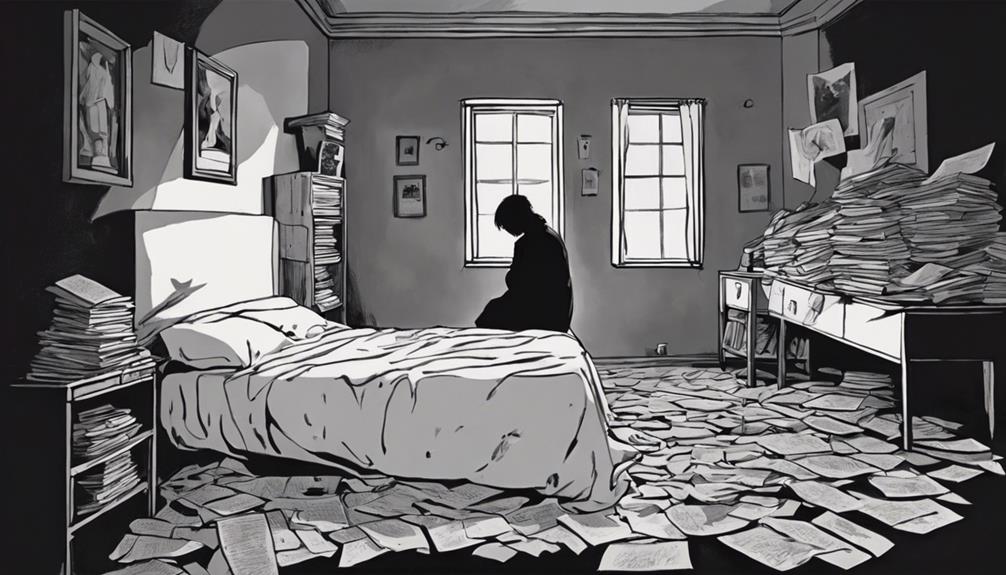Coping with the emotional fallout of infidelity can feel overwhelming, but you're not alone in this. It's vital to acknowledge your feelings of betrayal, confusion, and anger. These emotions are valid and part of your healing journey. Consider practicing self-care, like engaging in activities you enjoy or talking to someone you trust. Professional support, such as therapy, can provide you with coping strategies tailored to your needs. Remember, rebuilding trust takes time and open communication is key. Each step you take toward understanding your emotions is important for moving forward. Explore more strategies for your healing process ahead.
Understanding Emotional Turmoil

Discovering infidelity can plunge you into a whirlwind of emotional turmoil, leaving you grappling with feelings of betrayal, confusion, and deep hurt. It's completely normal to feel like your world has been turned upside down. The emotional triggers that arise can vary greatly from person to person, often igniting a cascade of memories and unresolved issues within your relationship dynamics.
You might find yourself questioning everything—your partner's intentions, your self-worth, and the foundation of your relationship. These feelings can be overwhelming, and it's essential to acknowledge them rather than suppress them. Understanding your emotional state is the first step toward healing.
Take a moment to reflect on what specifically triggers your emotional responses. Is it a song, a place, or even a conversation? Recognizing these triggers can help you process your feelings more effectively.
Communication with your partner is key, too. While it may be difficult, discussing your emotions can shed light on the complexities of your relationship dynamics and pave the way for understanding.
Effects on Self-Esteem
The emotional upheaval from infidelity often leads to a sharp decline in self-esteem, making you question your worth and place in the relationship. You may feel unworthy, betrayed, and uncertain, which can erode your confidence. It's important to acknowledge these feelings as valid and part of the healing process.
To begin the journey of self-worth restoration, focus on self-reflection. Identify your strengths and the qualities that make you unique. Engage in activities that bring you joy and fulfillment, allowing you to reconnect with yourself outside the relationship. Surround yourself with supportive friends and family who uplift you during this challenging time.
As you work through these emotions, consider open communication with your partner if you're both willing to rebuild your relationship. Discussing your feelings can foster understanding and pave the way for healing. Remember, rebuilding a relationship takes effort from both sides, and it's okay to set boundaries that protect your emotional well-being.
Ultimately, take your time to heal. Rebuilding your self-esteem is a gradual process, but with patience and support, you can emerge stronger and more in tune with your self-worth.
Anxiety and Depression

Coping with infidelity can trigger overwhelming feelings of anxiety and depression, leaving you trapped in a cycle of worry and sadness. You might find yourself constantly replaying events in your mind, struggling with guilt processing, and questioning your worth. These feelings can be intensified by the complex relationship dynamics at play, as trust erodes and emotional connections shift.
Recognizing these emotions is the first step toward healing. It's important to understand that feeling anxious or depressed after infidelity is entirely normal. You're not alone in this; many people experience similar reactions. Allow yourself to feel these emotions without judgment, as they're part of your healing journey.
Consider seeking professional help, like therapy, to unpack these feelings. A therapist can provide coping strategies tailored to your situation and help you navigate the tumultuous path ahead.
Engaging in self-care practices—like exercise, journaling, or mindfulness—can also be beneficial. Surround yourself with supportive friends or family who understand your pain.
Trust Issues and Relationships
Trust issues often emerge after infidelity, leaving you to navigate a landscape filled with uncertainty and fear about future relationships. You might find it hard to open up or believe in your partner's intentions, which can create a cycle of doubt and anxiety.
To begin rebuilding trust, it's crucial to establish open lines of communication. Share your feelings honestly and encourage your partner to do the same.
Consider implementing communication strategies that foster transparency. For instance, set aside regular times to check in with each other, discussing your feelings and any concerns that arise.
This proactive approach can help you both feel heard and understood, easing tension and paving the way for healing.
Coping Mechanisms for Healing

Finding effective coping mechanisms can greatly aid in your healing journey after experiencing infidelity.
First and foremost, prioritize self-care strategies. Engage in activities that nurture your body and spirit, such as exercise, meditation, or journaling. These practices can help you process your emotions and reclaim a sense of control.
Open communication is another essential coping mechanism. Talk to trusted friends or family members about your feelings. Sharing your experiences can alleviate feelings of isolation and provide perspective. If you're comfortable, consider discussing your emotions with your partner, as this can foster mutual understanding and healing.
Establishing routines can also provide stability during this tumultuous time. Structure your days with purposeful activities that bring you joy or fulfillment, whether it's picking up a new hobby or volunteering. Additionally, setting boundaries with your partner may help you regain a sense of security.
Lastly, be patient with yourself. Healing takes time, and it's okay to feel a range of emotions. Acknowledge your feelings, and remember that every step you take is progress on your journey toward healing.
Prioritize these coping mechanisms, and allow yourself the grace to heal at your own pace.
Seeking Professional Support
Reaching out for professional support can be an essential step in maneuvering the complex emotions and challenges that arise after experiencing infidelity. You don't have to navigate this painful journey alone.
Seeking therapy options can provide a safe space to explore your feelings, gain insights, and develop coping strategies. A licensed therapist can help you understand the emotional turmoil you're facing, whether it's anger, sadness, or confusion.
Support groups also offer a unique opportunity to connect with others who've gone through similar experiences. Sharing your story in a group setting can foster a sense of belonging and understanding, which is incredibly healing. You'll find that you're not alone in your struggles; many have faced the same heartache.
Don't hesitate to explore different therapy options, such as individual counseling or couples therapy, depending on your needs. Each path offers its own benefits, allowing you to choose what feels right for you.
Moving Forward After Betrayal

Healing after betrayal can feel overwhelming, but taking deliberate steps forward can help you regain a sense of control and hope.
Start by redefining boundaries in your relationship. It's vital to communicate openly about your needs and expectations moving forward. Discuss what's acceptable and what's not, creating a safe space for both of you to express your feelings.
Rebuilding intimacy can also play an important role in your healing journey. Focus on reconnecting emotionally and physically, taking small, intentional steps. Spend quality time together, engage in deep conversations, and rediscover what drew you to each other in the first place. This process isn't just about rekindling romance; it's about creating trust and understanding.
As you navigate this challenging path, remember to practice self-compassion. Acknowledge your feelings, and give yourself permission to grieve the loss of trust. Surround yourself with supportive friends or family who can offer encouragement.
Moving forward after betrayal isn't easy, but with patience and commitment, you can rebuild your relationship into something stronger and more resilient. You deserve healing and happiness, so take those steps—one day at a time.
Conclusion
Coping with the emotional fallout of infidelity can feel overwhelming, but remember, you're not alone in this journey.
Acknowledge your feelings and take the time you need to heal. Surround yourself with supportive friends and consider seeking professional help if needed.
Trust may take time to rebuild, but with patience and self-compassion, you can move forward.
Embrace the possibility of new beginnings, and know that brighter days are ahead if you stay committed to your healing process.
